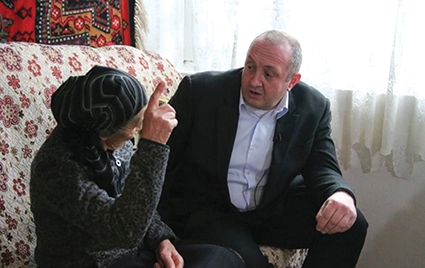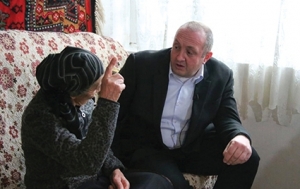The Fingers in the Pankisi Pie
OPED
That is happening in Pankisi? – this rhetorical question asked by the Minister of Foreign Affairs of Russia, Sergey Lavrov, has been answered by President Margvelashvili right from the Pankisi Gorge: “It is peaceful here,” said the President during his meeting with the locals, which was attended by the US Ambassador, Ian C. Kelly, and the Head of the European Mission, Janos Herman. It is hard to tell why Russia’s Foreign Affairs Minister has recalled Pankisi, though if we cast a glance at the transport or energy related battles between Russia and Georgia – everything becomes clearer.
The question about restoring diplomatic relations, asked by a Georgian journalist at a press-conference held on January 26th, was used by Russia’s chief diplomat to make a much more important statement: he unexpectedly mentioned the Pankisi Gorge in the context of the development of Georgian and Russian relations, restoring diplomatic ties, visa-free travel and the negotiations with Gazprom. Actually, he issued an ultimatum to the Georgian Government, something like: “Apart from Abkhazia and South Ossetia, we still have a lever against you and if you do not behave yourselves, we can raise the Pankisi issue again.” Not for the first time do we experience the Kremlin as proficient in creating such intrigues- thinking back, here, to the year 2000 when Russia sent the Chechen Field Commander Ruslan Gelaev with his army of 150 into that same Pankisi, and later asked us to allow the Russian troops in for his annihilation.
The Kremlin is trying to stage a similar play again, especially because it has a much more convincing reason to do so this time. Although there aren’t any Chechen fighters in Pankisi, there are young fighters that have left Pankisi Gorge and are fighting in the ranks of the ‘Islamic State’ in Syria.
It is crucial that the Kremlin doesn’t make such a decision, because if it does, it can easily push the Pankisi theme against Georgia, including by use of aggression.
Political expert Ramaz Sakvarelidze is convinced that the raising of the issue of Pankisi by Russia’s Foreign Affairs Minister already means that Russia has aggressive intention. “At the beginning of the paragraph, Lavrov says that he wants to improve relations with us, and at the end he wags his finger about the Pankisi issue. These two contradict each other. I have a reasonable suspicion that the issue of Pankisi is made up artificially, specifically for Russia’s aggressive rhetoric,” says Sakvarelidze.
In contrast to political experts who talk about the mistakes of Lavrov, ex-Justice Minister Valerian Khaburdzania, who maintains close relations with the Russian Security Services, blames official Tbilisi: “Russians asked me to negotiate cooperation on issues of terrorism with the Management of Georgian Security Services. The proposal was to cooperate on issues of antiterrorism regarding the Islamic State, exchanging information and mutual work. We got total disregard from Tbilisi. I am sure that Lavrov has been informed by those people who do not want Russian-Georgian relations to settle,” Valerian Khaburdzania told newspaper Alia.
By the way, the US Ambassador, Ian C. Kelly agreed with President Margvelashvili on the peacefulness in Pankisi. The Ambassador stressed that there aren’t any terrorist bases in the valley. Although how convincing the words of the US Ambassador are for Russia, the future will show.
Zaza Jgarkava












